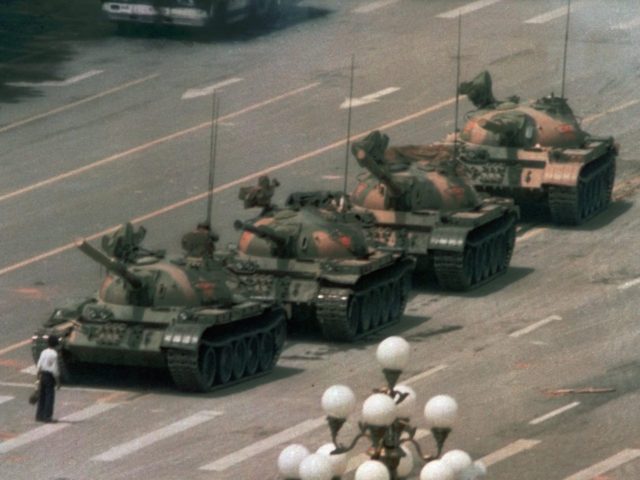Hong Kong police branded the city’s annual memorial for the victims of the Communist Party massacre at Tiananmen Square, Beijing, a “major threat to public health” on Monday, refusing to offer a permit.
Every year since the massacre, beginning in 1990, Hong Kong has organized a candlelight vigil in honor of those killed during the 1989 massacre in Beijing. The vigil usually takes place in the city’s large Victoria Park, attracting thousands of people. Police have allowed the move without objection — including after China took over Hong Kong in 1997 — until this week.
Hong Kong’s pro-China officials extended restrictions of public gatherings meant to contain the spread of the Chinese coronavirus last month, scheduling them to end June 5. When organizers submitted a request to hold the annual vigil on June 4, police said no.
“Public assemblies are a high-risk activity due to large crowds gathering,” the police department said in a letter rejecting permission for the vigil. “Police believe that the event will not only increase participants’ chances of contracting the virus but also threaten citizens’ lives and health, thus endangering public safety and affecting the rights of others.”
The letter was addressed to the organizer of the event, Richard Tsoi, vice-chair of Hong Kong Alliance in Support of Patriotic Democratic Movements in China. Tsoi told reporters that his group may file an appeal, though they had also begun encouraging people to engage in a socially distanced candlelight vigil by holding candles at their doorsteps.
The local broadcaster RTHK also highlighted impassioned comments from alliance Secretary-General Lee Cheuk-yan at a press conference on Monday in which he called the vigil a “litmus test” for One Country, Two Systems, the policy China agreed to govern Hong Kong under after the end of British rule. The policy prevents China from imposing Communist Party laws on the city and prevents the city from asserting national sovereignty.
“In a way it’s a litmus test of one country two systems, if they suppress us, it means that one country two systems is no more,” Lee said, expressing concern that observance of the anniversary at all may soon be illegal.
Hong Kong has seen a return of the pro-democracy protests that swept the region last year in the past month, as authorities were forced to ease coronavirus restrictions due to a lack of significant numbers of cases. The latest wave of protests is against a “national security” law passed by Beijing’s National People’s Congress, the Communist Party legislature, which allows Beijing to arrest and imprison Hong Kong residents for crimes such as “treason” and threats against the national security of China. As the Congress did not specifically enumerate elements of these crimes — but most dissent within China is tantamount to treason — Hongkongers have expressed alarm that they no longer possess freedom of expression.
At the press conference Monday, Lee noted that vigil attendees typically chant, “end one-party dictatorship,” which may now be illegal.
Lee also disparaged the alleged public health concerns to ban the vigil as “totally unreasonable and unscientific.”
“We will mourn individually. We hope that there will be candles lit up in various districts across the city including ours at Victoria Park,” Lee announced. “Each candlelight vigil is self-initiated and does not constitute an assembly.”
Hong Kong currently bans public gatherings of over eight people, so the organizers are hoping that small groups of eight will pop up throughout the city with candles. In addition, the Alliance has announced an online “vigil” and moment of silence that night.
The Tiananmen Square massacre of June 4, 1989, killed an untold number of people, believed to be at least in the thousands, who had gathered peacefully in the nation’s capital to demand pro-democratic reforms. In 1989, the influence of the Soviet Union was waning in much of the world and uprisings against communist regimes spreading. Communist Party officials in Beijing responded by killing as many as possible, including many young people and students, in a military assault Beijing celebrated as recently as last year.
Outside of Hong Kong, the Communist Party strictly censors searches related to the massacre. On June 4, even trying to conduct online searches for words like “today” could yield no results.
In an exception, state media covered the massacre last year approvingly, a rare acknowledgment it ever occurred.
Without mass killings, “China would have followed the way of the Soviet Union and collapsed,” an “expert” told the state-run Global Times.
“That incident was a political turbulence and the central government took measures to stop the turbulence which is a correct policy,” China’s defense minister General Wei Fenghe said last year. “The 30 years have proven that China has undergone major changes China has enjoyed stability and development.”

COMMENTS
Please let us know if you're having issues with commenting.